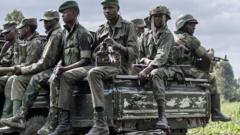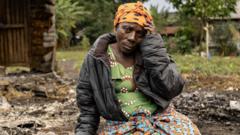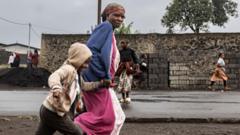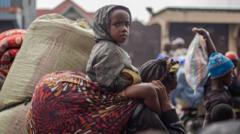Guatemalan forces join other nations in a mission to restore peace in Haiti, a country struggling under the weight of violent gangs and dire instability.
Guatemalan Troops Deployed to Aid Haiti's Struggle Against Gang Violence
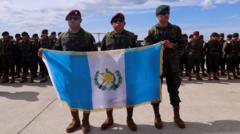
Guatemalan Troops Deployed to Aid Haiti's Struggle Against Gang Violence
A united international effort begins as Guatemalan military arrives in Haiti amidst ongoing crisis
Guatemalan security forces have landed in the heart of Port-au-Prince, the capital city of Haiti, to assist in combatting rampant gang violence. A contingent of 150 Guatemalan soldiers, primarily from military police units, arrived over the weekend, with the first 75 soldiers touching down on Friday followed by an additional 75 on Saturday. This deployment is part of a broader international initiative aimed at stabilizing Haiti, which has faced prolonged turmoil from armed groups exerting control over the region.
The mission is backed by the United Nations and builds upon efforts led by Kenya, which has previously dispatched nearly 400 police officers to stem the tide of violence. The Guatemalan troops represent the initial group of a UN-sanctioned international force set to comprise a total of 2,500 officers from various countries. Other nations, such as Jamaica, Belize, and El Salvador, have also contributed small contingents to the cause, while the financial muscle behind the operation comes from the United States.
Haiti has been under a state of emergency for months, deeply affected by gang violence that escalated significantly following armed assaults on the country's largest prisons earlier this year, resulting in the release of approximately 3,700 inmates. Originally declared on March 3, this state of emergency reflects the government's ongoing struggle against the domination of gangs in areas like the Ouest Department, which encompasses Port-au-Prince.
The historical context reveals a nation reeling from decades of economic hardship, political instability, and natural disasters. Since the assassination of President Jovenel Moïse in 2021, Haiti has plunged deeper into chaos marked by ineffective governance and intensified gang activity. As the international community rallies to restore order, reports indicate that violence continues unabated, with recent incidents highlighting the brutal realities facing residents in Haiti.
The mission is backed by the United Nations and builds upon efforts led by Kenya, which has previously dispatched nearly 400 police officers to stem the tide of violence. The Guatemalan troops represent the initial group of a UN-sanctioned international force set to comprise a total of 2,500 officers from various countries. Other nations, such as Jamaica, Belize, and El Salvador, have also contributed small contingents to the cause, while the financial muscle behind the operation comes from the United States.
Haiti has been under a state of emergency for months, deeply affected by gang violence that escalated significantly following armed assaults on the country's largest prisons earlier this year, resulting in the release of approximately 3,700 inmates. Originally declared on March 3, this state of emergency reflects the government's ongoing struggle against the domination of gangs in areas like the Ouest Department, which encompasses Port-au-Prince.
The historical context reveals a nation reeling from decades of economic hardship, political instability, and natural disasters. Since the assassination of President Jovenel Moïse in 2021, Haiti has plunged deeper into chaos marked by ineffective governance and intensified gang activity. As the international community rallies to restore order, reports indicate that violence continues unabated, with recent incidents highlighting the brutal realities facing residents in Haiti.







